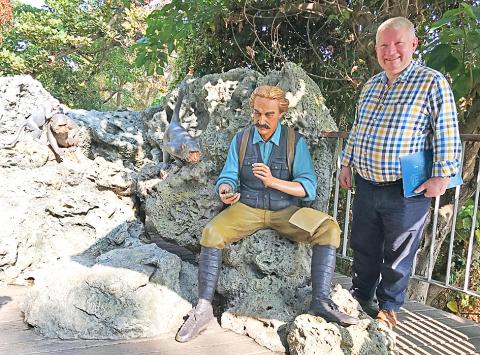A descendant of Robert Swinhoe, the first British consul in what was then known as Formosa, on Thursday visited the British Consulate at Takow (打狗英國領事館) in Kaohsiung, hoping to deepen his understanding of his ancestor.
Robert Swinhoe was stationed in Taiwan in July 1861 as the first British vice-consul, and he set up the first British Consular Office in Taiwan in Taiwanfu (modern-day Tainan), the Kaohsiung Bureau of Cultural Affairs said.
Three years later, Britain relocated the vice consulate from Taiwanfu to Takao (modern-day Kaohsiung), after the Port of Kaohsiung was opened.

Photo: Huang Chia-lin, Taipei Times
The vice consulate was upgraded to a consulate in 1865, with Swinhoe appointed its first consul.
Aside from his official capacities, Swinhoe was also a renowned biologist, introducing the first systematic catalog of Chinese and Taiwanese birds to Asia.
He also discovered more than one-third of birds in Taiwan, including Swinhoe’s pheasant, which is named after him.
Swinhoe was also responsible for certifying that the Formosan macaque was endemic to Taiwan.
Arriving in Taiwan on Thursday, Christopher Swinhoe-Standen visited the old consulate building, which is now a museum, accompanied by officials from the Kaohsiung Bureau of Tourism.
After taking a picture with Swinhoe’s statue on the premises — which showed Swinhoe discovering the macaques and the Odorrana swinhoana, or Swinhoe’s brown frog, which is also endemic to Taiwan — the bureau arranged a boat tour that took Swinhoe-Standen on the route his ancestor took when he cicumnavigated Formosa in 1858.
Learning about his ancestor’s past on the boat ride and taking in Kaohsiung’s excellent scenery was most enjoyable, Swinhoe-Standen said.
He would be sharing the photograph with his 91-year-old mother, Swinhoe-Standen said, adding that he was sure the story would be told for quite a while in the family.

Taiwan is gearing up to celebrate the New Year at events across the country, headlined by the annual countdown and Taipei 101 fireworks display at midnight. Many of the events are to be livesteamed online. See below for lineups and links: Taipei Taipei’s New Year’s Party 2026 is to begin at 7pm and run until 1am, with the theme “Sailing to the Future.” South Korean girl group KARA is headlining the concert at Taipei City Hall Plaza, with additional performances by Amber An (安心亞), Nick Chou (周湯豪), hip-hop trio Nine One One (玖壹壹), Bii (畢書盡), girl group Genblue (幻藍小熊) and more. The festivities are to

Auckland rang in 2026 with a downtown fireworks display launched from New Zealand’s tallest structure, Sky Tower, making it the first major city to greet the new year at a celebration dampened by rain, while crowds in Taipei braved the elements to watch Taipei 101’s display. South Pacific countries are the first to bid farewell to 2025. Clocks struck midnight in Auckland, with a population of 1.7 million, 18 hours before the famous ball was to drop in New York’s Times Square. The five-minute display involved 3,500 fireworks launched from the 240m Sky Tower. Smaller community events were canceled across New Zealand’s

AFTERMATH: The Taipei City Government said it received 39 minor incident reports including gas leaks, water leaks and outages, and a damaged traffic signal A magnitude 7.0 earthquake struck off Taiwan’s northeastern coast late on Saturday, producing only two major aftershocks as of yesterday noon, the Central Weather Administration (CWA) said. The limited aftershocks contrast with last year’s major earthquake in Hualien County, as Saturday’s earthquake occurred at a greater depth in a subduction zone. Saturday’s earthquake struck at 11:05pm, with its hypocenter about 32.3km east of Yilan County Hall, at a depth of 72.8km. Shaking was felt in 17 administrative regions north of Tainan and in eastern Taiwan, reaching intensity level 4 on Taiwan’s seven-tier seismic scale, the CWA said. In Hualien, the

‘IRRESPONSIBLE’: Beijing’s constant disruption of the ‘status quo’ in the Taiwan Strait has damaged peace, stability and security in the Indo-Pacific region, MOFA said The Presidential Office yesterday condemned China’s launch of another military drill around Taiwan, saying such actions are a “unilateral provocation” that destabilizes regional peace and stability. China should immediately stop the irresponsible and provocative actions, Presidential Office spokeswoman Karen Kuo (郭雅慧) said, after the Chinese People’s Liberation Army (PLA) yesterday announced the start of a new round of joint exercises around Taiwan by the army, navy and air force, which it said were approaching “from different directions.” Code-named “Justice Mission 2025,” the exercises would be conducted in the Taiwan Strait and in areas north, southwest, southeast and east of Taiwan